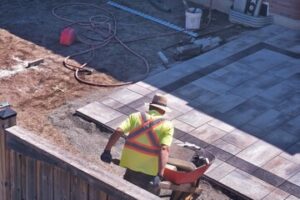Landscaping Springdale AR is the art of creating beautiful, functional outdoor areas. It boosts curb appeal and property value, enhances a home’s livability, and provides environmental benefits.

Proper landscaping uses visual details like color, line and shape to draw the eye to the landscape’s focal point. It also uses a mix of plants that can survive your local climate and sun/moisture conditions.
Investing in sustainable landscaping helps reduce maintenance and energy costs. For example, drought-tolerant ground covers eliminate the need for mowing and watering. In addition, trees and shrubs can act as windbreaks to lower outdoor temperatures, further reducing energy bills. Also, utilizing drip irrigation keeps soil moist without wasting water. Moreover, installing low-flow irrigation systems reduces the amount of fertilizer needed. Furthermore, watering plants in the early morning reduces evaporation.
Irrigation methods vary in efficiency, cost, and environmental risk. Flood irrigation can be effective but loses water through evaporation, furrow irrigation is inexpensive but lacks control, spray irrigation offers more control but can be expensive, and drip irrigation provides maximum efficiency but is more costly. Adequate soil water influences seedbed preparation, germination, root growth, nutrient utilization, plant growth and development, and yield.
Water is constantly used by crops, and the rate of use varies according to atmospheric conditions, species characteristics, season, and soil type. The ability of soils to store water varies and is related to their texture, organic matter content, and depth. In general, sandy soils store less water than loamy or clay loam soils. Irrigation allows water to be stored in the soil for later use by crops.
Soil permeability, plant spacing, and ridges play an important role in how much irrigation water is actually absorbed. Likewise, row length can affect how much water is applied per acre. Rows that are too long can lead to soil saturation near the point of water introduction, whereas rows that are too short may not receive sufficient irrigation.
While overwatering is an obvious waste of water, underwatering can be just as harmful. Too little water can prevent weeds from being pulled and lead to poor stand, reduced yield, and low quality.
Proper landscape design can increase the value of your home and save time on yard work. In fact, studies show that potential buyers are willing to spend more on a house with professionally landscaped front and back yards. The beauty of green spaces also encourages people to spend more time outdoors, which can reduce stress and boost mental health. Plus, gardens and trees provide a natural habitat for wildlife and can absorb carbon dioxide. One tree, for instance, can remove 26 pounds of carbon dioxide from the air each year!
Irrigation Scheduling
The scheduling of irrigation activities is an important step to managing crop water use. Effective irrigation schedules depend on crop, soil type, and production practices. They also depend on climatic factors such as rainfall and temperature. This publication provides basic information on the first four of these factors-on veil, water, and plant relationships-to help growers develop efficient irrigation schedules.
Several factors influence the amount of water needed to make a crop productive, including leaf area index (LAI), canopy openness, and soil water content. Many crops are sensitive to water stress, which may reduce fruit size or quality. Irrigation can be used to control water stress by increasing the number of irrigation events, or by decreasing the duration of each event.
There are several different types of irrigation systems, including drip, sprinkler, and flood irrigation. Each type has its own advantages and disadvantages. The type of irrigation system used will affect how quickly the water is applied and how evenly it is distributed over the surface. It will also affect how much evaporation is lost, and how quickly the soil becomes saturated.
Water balance irrigation scheduling uses a soil moisture sensor and accumulated radiation to estimate crop water demands. This method significantly reduces irrigation amounts and improves IWP compared to timer-based scheduling. It can be used for single fields or across a network of stations.
Another way to schedule irrigation is with a mobile application such as Irrigation Scheduler Mobile, available from AgWeatherNet and other agricultural weather networks. This tool is easy to use and works well on most mobile devices. It tracks the progression of the soil water deficit curve and notifies the user when the field is approaching estimated first stress. It also shows a daily budget table that can be adjusted over the season based on what the user sees in the field.
Lastly, the amount of soil available for water storage and infiltration influences the frequency and duration of irrigation. More available soil water will allow for less frequent irrigations, which reduces the risk of overwatering and improves water utilization. However, more frequent irrigations increase evaporation from the soil surface and decreases crop water uptake.
Irrigation Costs
The costs associated with irrigation depend on several factors. The type of irrigation system you choose, how large your landscape is and the size of your budget will all affect your costs. Labor rates also vary by region, with higher labor rates in coastal areas and cities. The soil in your yard will also impact installation costs. Dense, rocky soil requires more effort to work with, which can increase labor costs.
A quality landscaping company will be able to guide you through the process and provide a detailed quote. Typically, the cost of an irrigation system is around $3,600 for a quarter-acre lawn. However, this figure can fluctuate based on the complexity of your system and its features.
Landscaping provides numerous benefits to property owners. For example, it helps reduce energy costs by keeping your home cooler. Additionally, plants and trees help improve air quality by absorbing pollutants and releasing oxygen. Landscaping can also enhance the value of your property. When done correctly, it can create a sense of identity and character for your community.
Many governments subsidize the production of crops and vegetables through irrigation. While this can have positive impacts on the economy, it can also have negative social and environmental consequences that are not accounted for in the market system. Therefore, it is important to examine the overall effects of subsidised irrigation.
When choosing a name for your landscaping company, it is important to choose one that reflects your business model. You should also make sure that your name is unique and not similar to any other companies in your industry or area. This will help to avoid potential legal issues down the road.
You should also consider including a marketing plan in your business plan. This will help you define the target audience for your services and how to reach them. It will also help you understand how your business will grow over time.
Creating a business plan for your irrigation company is an important step in starting your own company. It will help you identify the key factors in the success of your business, as well as the obstacles that may arise. Moreover, a good business plan will also help you attract investors and lenders.
Irrigation Efficiency
Landscaping can make a property more appealing, but it also plays an important role in the health of the environment. For example, it prevents invasive plants from spreading and threatening the local ecosystem. It also keeps the soil healthy and promotes a good habitat for wildlife. Additionally, it can help reduce energy bills by reducing the need for air conditioning and heating. By following eco-friendly principles, homeowners can save up to 24 gallons of water per day. Using drip irrigation, planting trees and shrubs for shade, and watering in the early morning are some simple ways to conserve water.
The efficiency of irrigation is determined by the amount of water that is actually absorbed by the soil. The biggest losses are from evaporation and wind, which can account for up to 50% of irrigation water use in some areas. It is important to know your area’s Et rate and the corresponding irrigation schedule. This can be done by contacting your local water district or extension service. It is recommended to plant trees and shrubs that are adapted to your local climate and microclimate. Additionally, it is beneficial to group plants with similar water needs together to maximize efficiency.
Another factor in irrigation efficiency is determining the amount of water that reaches the roots, which can be measured using a catch can method or by utilizing soil moisture sensors. This allows for a more accurate and efficient way to irrigate, and it can reduce field variability.
Increasing the efficiency of irrigation practices is a crucial step to tackling water scarcity. However, this approach must be carefully evaluated to avoid potential ecological or economic costs. The efficiency gains must be weighed against the loss of re-usable return flows from irrigation systems that may provide valuable services such as drinking water, fisheries, navigation and ecosystems services. Moreover, it is essential to understand the impact of irrigation efficiency on water consumption at the local level to determine the true water savings. This will allow for policymakers to better assess whether a shift in efficiency can be used to offset water shortages and other associated costs.



